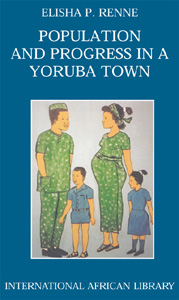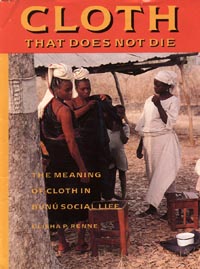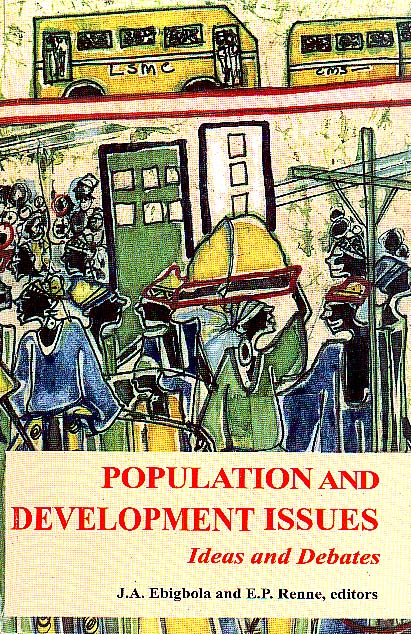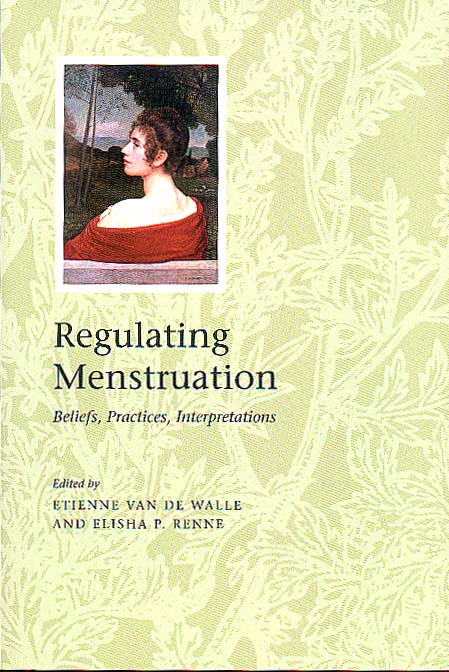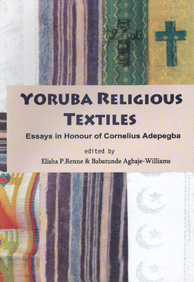Elisha P. Renne
Professor
Department of Anthropology
101 West Hall
Ann Arbor, MI 48109-1092
(734) 647-9622; fax: (734) 763-6077
Center for Afroamerican and African Studies
4700 Haven Hall
Ann Arbor, MI 48109-1045
(734) 764-9917; fax: (734) 763-0543
E-Mail: erenne@umich.edu
|
 |
Recent Activities
Elisha P. Renne is a professor in the Department of Anthropology and the Department of Afroamerican and African Studies, University of Michigan-Ann Arbor. Renne earned her Ph.D. in anthropology from New York University in 1990. Her dissertation focused on colonial law, marriage practices, and gender relations in southwestern Nigeria. This research formed the basis for her book, Cloth That Does Not Die: The Meaning of Cloth in Bunu Social Life (Seattle: University of Washington Press, 1995), which was a finalist for the 1996 Herskovits Award (African Studies Association). From 1991 to 1993, Renne was a post-doctoral fellow at Australia National University, Canberra, where she collaborated with demographers on a research project studying fertility change in southwestern Nigeria. She has also taught at Ahmadu Bello University, Zaria, Nigeria, as a Fulbright Scholar, and at Princeton University, where she was a Mellon Research Fellow, before joining the University of Michigan faculty in 1998. At Michigan, she has conducted graduate seminars on contemporary African societies, demographic anthropology, and African textiles and social history; and undergraduate courses on introductory anthropology, Africa and the African Diaspora, childbirth and culture, maternal/child health and the environment, and African women. Her areas of research interest include: African ethnology; medical anthropology; fertility and reproductive health; gender relations; the anthropology of development; religion and social change; and the anthropology of cloth.
Renne’s research in Nigeria focuses on her continuing interest in issues relating to medical anthropology, gender relations, and textiles. She is involved in several projects associated with the Michigan African Studies Initiative, including the organization of a workshop on African textiles/texts, participation in a symposium on women’s health in Nigeria, and contributions to the UM-Global Health Research Training project. Her monograph, Population and Progress in a Yoruba Town, was published by the University of Edinburgh Press and University of Michigan Press in 2003. She is also the co-editor of the volumes, Regulating Menstruation: Beliefs, Practices, Interpretations (with E. van de Walle; 2001); Population and Development Issues (with J.A. Ebigbola; 2001), and Yoruba Religious Textiles: Essays in Honour of Cornelius Oyeleke Adepegba (with B. Agbaje-Williams, 2005). During the summer 2005, she received a Fulbright Senior Fellowship to work with Dr. Salihu Maiwada, Ahmadu Bello University, on the project, New Technologies of Machine-Embroidered Robe Production and Changing Gender Roles in Zaria, Nigeria. She has also carried out research, begun as a 2005-2006 fellow in the Michigan Institute of the Humanities, focusing on spiritual ties and spatial connections maintained through white garments use by members of Nigerian-based Cherubim & Seraphim churches in the United States, which has been published in a special issue of Material Religion on Christian art in Africa and the African Diaspora.
Renne’s on-going work includes a study of the polio eradication initiative in Northern Nigeria, focusing on the historical, cultural, political context of this campaign, with publications in Social Science & Medicine (2006), Post-Polio International (2008), History Compass (2012), and in the edited volume, Anthropology and Public Health: Bridging Differences in Culture and Society (2009). The book, The Politics of Polio in Northern Nigeria, published by Indiana University Press in July 2010, was selected as the 1st place finalist for the ASA Nigerian Association book award in 2011.
Her most recent work, for which she received a 2012 Guggenheim Research Fellowship, focuses on veils, turbans, and Islamic reform in northern Nigeria. The project builds upon her previous research on veiling in Nigeria, which was published in the edited volume, Veiling in Africa (E. Renne, ed.; Indiana University Press, 2013), and in Fashion and Power in Africa (K. Hansen and S. Madison, eds; Bloomsbury Academic 2013). Renne’s current work on turbaning, textile production, and Islamic reform in Kaduna, Nigeria, contributed to the exhibition entitled, “Sir Ahmadu Bello and the Kaduna Textile Industry,” which was held at Arewa House, Kaduna, Nigeria, in November 2012. A related paper, written by Salihu Maiwada and Elisha Renne, on the Kaduna textile industry and the decline of textile manufacturing in northern Nigeria is in press with the journal, Textile History. Renne is currently working on the book manuscript which examines the connections between textile production, dress, and expressions of Islamic reform in northern Nigeria.
Elisha Renne, along with her co-PI, Niladri Basu (UM School of Public Health), is also the recipient of a University of Michigan Graham Institute, Integrated Assessment Award, 2012-2015. This project focuses on the health and environmental consequences of small-scale gold mining in northeastern Ghana. She has co-authored several papers associated with this project, published in Science of the Total Environment (2010), Women & Environments (2011), and Human Organization (in press).
Some Recent Publications
Veiling/Counter-veiling in Sub-Saharan Africa. In: Veiling in Africa, E. Renne, ed. Bloomington: Indiana University Press, pp. 1-12, 2013.
Educating Muslim Women and the Izala Movement in Zaria City, Nigeria. Islamic Africa 3(1): 55-86, 2012, www.islamicafricajournal.org.
The 1917 Polio Outbreak in Montpelier, Vermont, Vermont History 79(2):162-81, 2011.
Figured and Empty Space: An Aesthetics of Textiles and Dress in Nigeria. In: African Lace, B. Plankensteiner & N. Adediran, eds. Vienna: Museum of Ethnologie, pp. 71-89, 2010.
Anthropological and Public Health Perspectives on the Polio Eradication Initiative in Northern Nigeria. In: Anthropology and Public Health: Bridging Differences in Culture and Society, R. Hahn and M. Inhorn, eds,Oxford Univ. Press, pp. 512-38, 2009.
Consecrated Garments and Spaces in the Cherubim & Seraphim Church Diaspora, Material Religion 5(1):70-87, 2009.
Anniversary Cloths as Historical Markers of the Anglican Church in Ondo, Nigeria. Textile: Journal of Cloth and Culture 6(2):156-75, 2008 (with Tunde Akinwumi).
Mass Producing Food Traditions for West Africans Abroad, American Anthropologist 109(4):616-25, 2007.
New Technologies of Machine-Embroidered Robe Production and Changing Work and Gender Roles in Zaria, Nigeria, Textile History 38(1):25-58, 2007 (with Salihu Maiwada).
Perspectives on Polio and Immunization in Northern Nigeria. Social Science & Medicine 63(7):1857-69, 2006.
Childhood Memories and Contemporary Parenting in Ekiti, Nigeria. Africa 75(1):63-82, 2005.
Yoruba Religious Textiles: Essays in Honour of Cornelius Oyeleke Adepegba, E. Renne and B. Agbaje-Williams, eds. Ibadan: Book Builders, 2005.
“Let your garments always be white”: Expressions of the Past and Present in Yoruba Religious Textiles. In: African Religion and Social Change: Essays in Honor of John Peel, T. Falola, ed. Durham: Carolina Academic Press, pp. 139-63, 2005.
Dressing in the Stuff of Dreams: Sacred Dress and Religious Authority in Southwestern Nigeria. C. Stewart, ed. Dreaming 14 (2-3):120-35, 2004.
From Khaki to Agbada: Dress and Political Transition in Nigeria. In: Fashioning Nations: Clothing, Politics, and African Identities in the 20 th Century, J. Allman, ed. Bloomington: Indiana University Press, pp. 125-43, 2004.
Gender Roles and Women’s Status: What They Mean to Hausa Muslim Women in Northern Nigeria. In: Qualitative Demography: Categories and Contexts in Population Studies. S. Szreter, A. Dharmalingam, and H. Sholkamy, eds. Oxford: Oxford University Press, pp. 276-94, 2004.
Changing Assessments of Abortion in a Northern Nigerian Town. In: Abortion in a Changing World, A. Basu, ed. Westport CT: Greenwood Press, pp. 119-38, 2003.
Fundamentals of Fertility: Cosmology and Conversion in a Southwestern Nigerian Town, Journal of the Royal Anthropological Institute 8(3):551-69, 2002.
“Cleaning the Inside” and the Regulation of Menstruation in Southwestern Nigeria. In: Regulating Menstruation, E. van de Walle and E. Renne, eds. Chicago: University of Chicago Press, pp. 187-201, 2001.
Twinship in an Ekiti Yoruba Town. Ethnology 40(1): 63-78, 2001.
Cloth and Conversion: Yoruba Textiles and Ecclesiatical Dress. In: Undressing Religion: Commitment and Conversion from a Cross-Cultural Perspective, L. Arthur, ed. Oxford: Berg, pp. 7-24, 2000.
Nigeria’s “Demographic Delusion” and the 1991 Census Exercise in a Southwestern Nigerian Town. In: Population and Development Issues, J.A. Ebigbola and E. Renne, eds. Ibadan: African BookBuilders Ltd, pp. 303-320, 2000.


